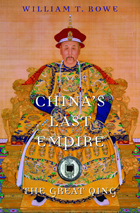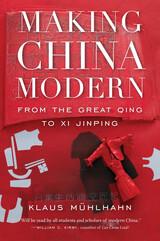
In a brisk revisionist history, William Rowe challenges the standard narrative of Qing China as a decadent, inward-looking state that failed to keep pace with the modern West.
The Great Qing was the second major Chinese empire ruled by foreigners. Three strong Manchu emperors worked diligently to secure an alliance with the conquered Ming gentry, though many of their social edicts—especially the requirement that ethnic Han men wear queues—were fiercely resisted. As advocates of a “universal” empire, Qing rulers also achieved an enormous expansion of the Chinese realm over the course of three centuries, including the conquest and incorporation of Turkic and Tibetan peoples in the west, vast migration into the southwest, and the colonization of Taiwan.
Despite this geographic range and the accompanying social and economic complexity, the Qing ideal of “small government” worked well when outside threats were minimal. But the nineteenth-century Opium Wars forced China to become a player in a predatory international contest involving Western powers, while the devastating uprisings of the Taiping and Boxer rebellions signaled an urgent need for internal reform. Comprehensive state-mandated changes during the early twentieth century were not enough to hold back the nationalist tide of 1911, but they provided a new foundation for the Republican and Communist states that would follow.
This original, thought-provoking history of China’s last empire is a must-read for understanding the challenges facing China today.

“Thoughtful, probing…a worthy successor to the famous histories of Fairbank and Spence [that] will be read by all students and scholars of modern China.”
—William C. Kirby, coauthor of Can China Lead?
It is tempting to attribute the rise of China to Deng Xiaoping and to recent changes in economic policy. But China has a long history of creative adaptation. In the eighteenth century, the Qing Empire dominated a third of the world’s population. Then, as the Opium Wars and the Taiping Rebellion ripped the country apart, China found itself verging on free fall. More recently, after Mao, China managed a surprising recovery, rapidly undergoing profound economic and social change. A dynamic story of crisis and recovery, failure and triumph, Making China Modern explores the versatility and resourcefulness that guaranteed China’s survival, powered its rise, and will determine its future.
“Chronicles reforms, revolutions, and wars through the lens of institutions, often rebutting Western impressions.”
—New Yorker
“A remarkable accomplishment. Unlike an earlier generation of scholarship, Making China Modern does not treat China’s contemporary transformation as a postscript. It accepts China as a major and active player in the world, places China at the center of an interconnected and global network of engagement, links domestic politics to international dynamics, and seeks to approach China on its own terms.”
—Wen-hsin Yeh, author of Shanghai Splendor
READERS
Browse our collection.
PUBLISHERS
See BiblioVault's publisher services.
STUDENT SERVICES
Files for college accessibility offices.
UChicago Accessibility Resources
home | accessibility | search | about | contact us
BiblioVault ® 2001 - 2024
The University of Chicago Press









